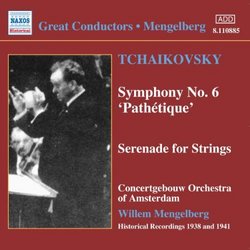| All Artists: Tchaikovsky, Mengelberg Title: Mengelberg Conducts Tchaikovsky Members Wishing: 0 Total Copies: 0 Label: Naxos Release Date: 7/20/2004 Genre: Classical Styles: Forms & Genres, Serenades & Divertimentos, Historical Periods, Modern, 20th, & 21st Century, Symphonies Number of Discs: 1 SwapaCD Credits: 1 UPC: 636943188521 |
Search - Tchaikovsky, Mengelberg :: Mengelberg Conducts Tchaikovsky
 | Tchaikovsky, Mengelberg Mengelberg Conducts Tchaikovsky Genre: Classical
|
Larger Image |
CD Details |
CD ReviewsMengelberg and Tchaikovsky. John Austin | Kangaroo Ground, Australia | 08/08/2004 (5 out of 5 stars) "Although Tchaikovsky did not live long enough to witness the championing of his music by the great Dutch conductor Willem Mengelberg, his younger brother Modest lived to become an immense admirer of the latter's work with the Amsterdam Concertgebouw Orchestra, even endorsing (according to Mengelberg) cuts to the last movement of Tchaikovsky's Fifth Symphony. Mengelberg did not dare to make cuts to any part of Tchaikovsky Sixth Symphony, heard in this welcome Naxos reissue of a 1941 Telefuncun recording. Music relating to a manic-depressive mental condition suited him well. The Telefuncun recording policy also suited him well. Both conductor and recording engineers favored interventionism. Notice, for example, the moment at 8' 50" in the symphony's first movement just before the whole orchestra explodes at Allegro Vivo. Tchaikovsky marks the preceding bassoon solo pppppp, but it is very audible here. So too is the audible "placing" of the various sections of the orchestra in the third movement - more audibly obvious than in any modern stereo recording I have heard. Hearing this recording for the first time, I especially enjoyed the symphony's last two movements. I always enjoy hearing the Serenade for Strings, heard here in somewhat more muffled sonority from a 1938 Telefuncun recording. This is one of Tchaikovsky's greatest works. Mengelberg's recordings seem to be frequently coming up for rehearing and reassessing in the C21st. A Telefuncun recording of Schubert's "Unfinished" symphony is certainly one that deserves reissue - if copies of it still exist. " Mixed Feelings About This One J Scott Morrison | Middlebury VT, USA | 08/03/2004 (4 out of 5 stars) "I admire Willem Mengelberg's conducting and have liked most of what I've heard of his recordings. And there is much about this recording that I like. I especially was struck by an almost unbridled passion in the playing of the Concertgebouw in the 'Pathétique' Symphony, in the outer movements especially. But there are problems. The sound is pretty rough in spots, especially in III where the opening string chords are squally. (Wizard recording engineer Mark Obert-Thorn, the producer of this recording, comments that he took the best sound from several copies of the 1941 Telefunken shellac pressings but that there are some bad spots; this must be one of them.) Further, there is, for me, a rather intrusive use of string portamento (really noticeable in the second theme of the finale) that began grating on me after a few repetitions. Still, the shaping, the nuanced expression and the passion of the performance are ultimately winning.
The second work here is the String Serenade, Op. 48, and it does not suffer from the deficiencies of the Symphony, even though it was recorded three years earlier, in 1938. It is obvious that Mengelberg and his band adored this music; it is played con amore. Is there anyone who doesn't respond to the grace and charm of this suite? Historical note: the Pathétique was recorded by the Concertgebouw in April 1941 just before the occupying Nazi government ordered Jews expelled from the orchestra. This is an important document in that it is one of only two recordings Mengelberg, an early European champion of Tchaikovsky, made of the Pathétique. And the Concertgebouw was the first orchestra outside Russia to play it; their knowledge of it goes back to 1895. In this recording one hears a dramatic and emotional style of performance that doesn't seem to exist these days. So, if this is your meat, go for it. You certainly can't beat the Naxos price. Scott Morrison" |

 Track Listings (8) - Disc #1
Track Listings (8) - Disc #1